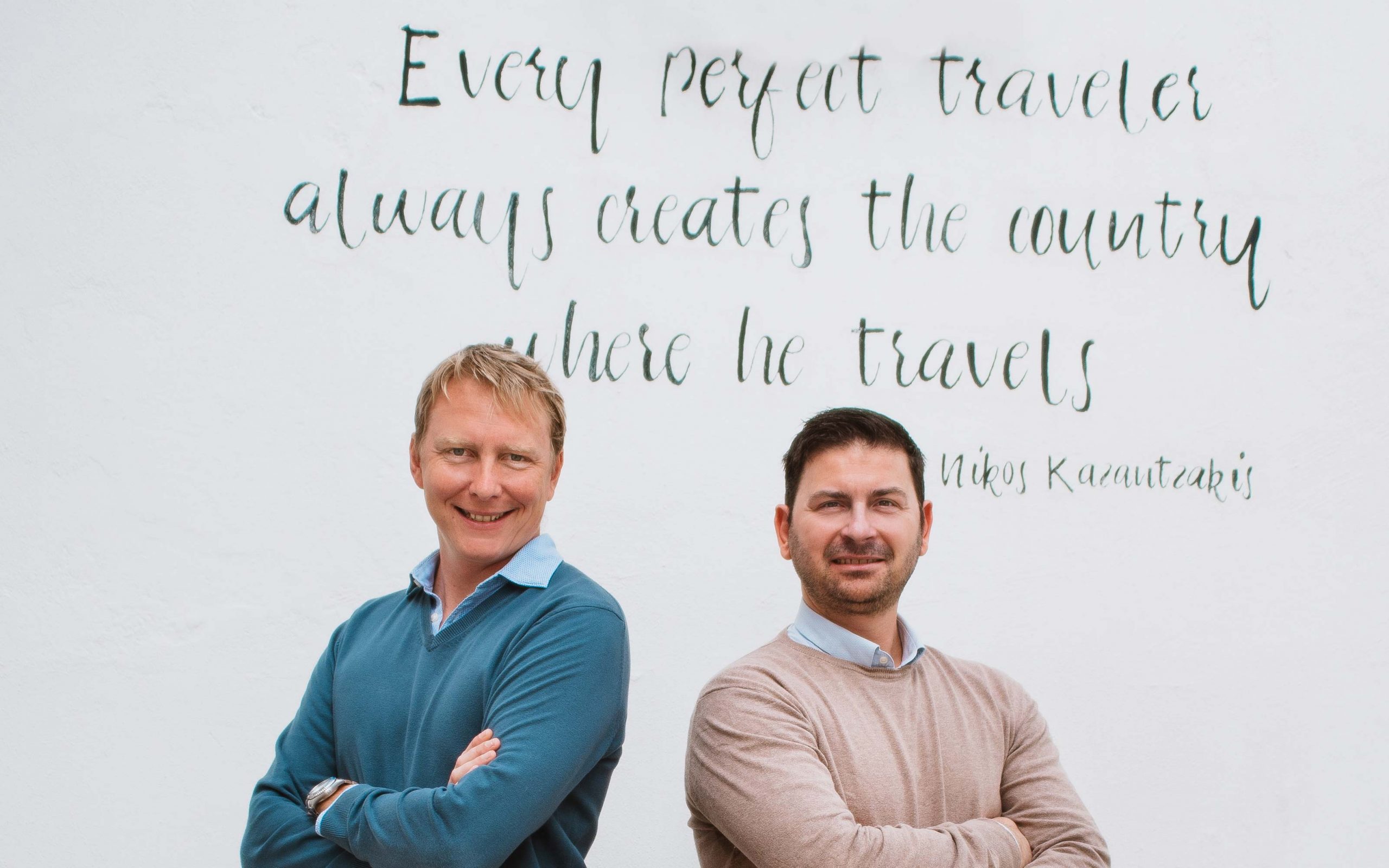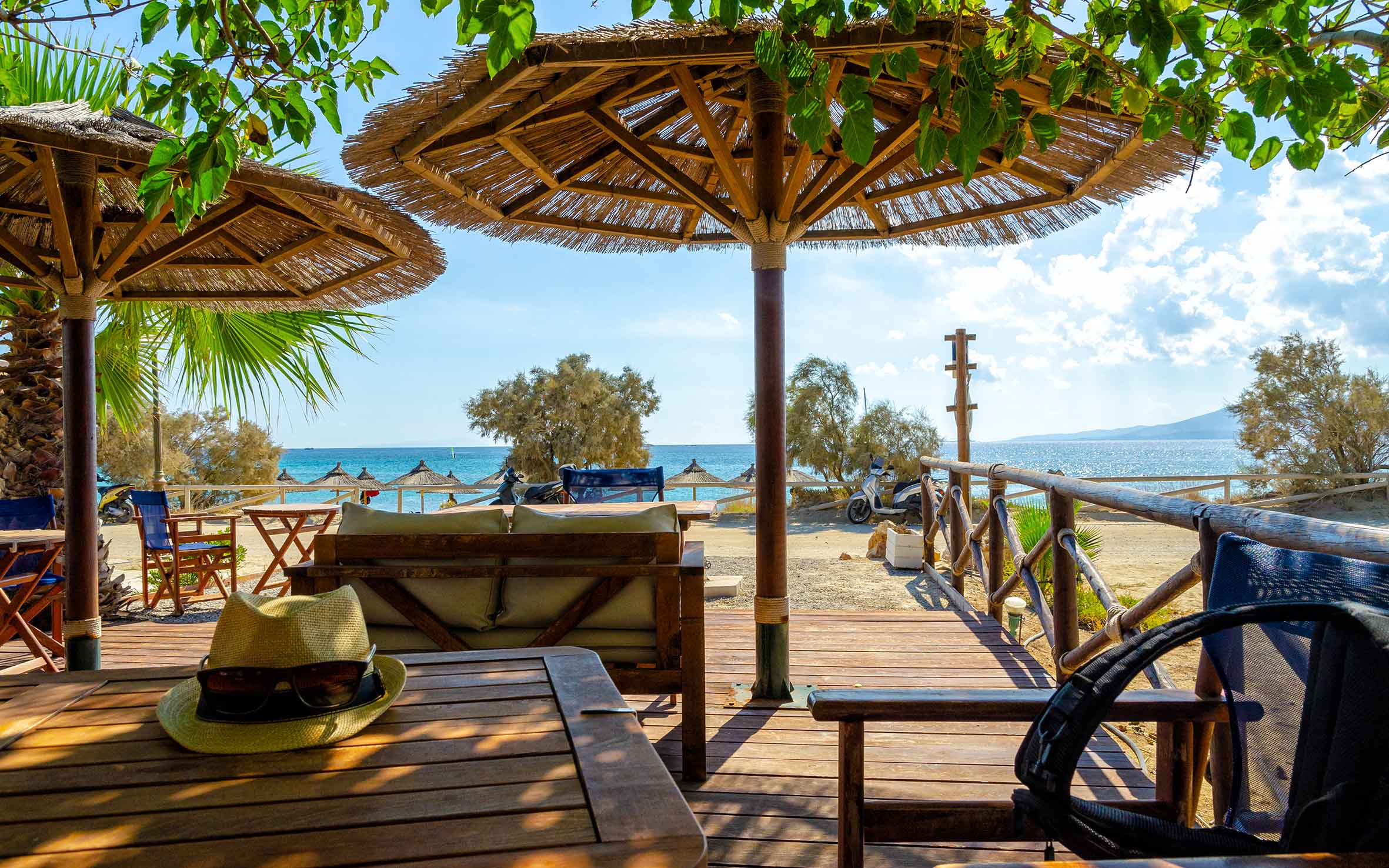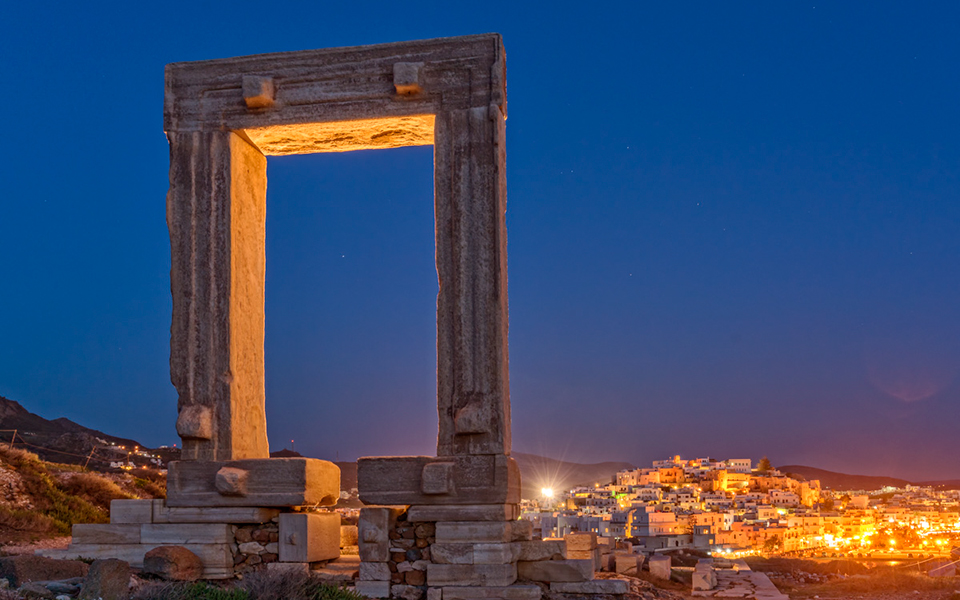Your 3-Day Guide to Andros Island
Shady hiking trails, a vibrant cultural...

Luca Lattanzio and Gerome Bijou fell in love with Naxos, organized their life on the Greek island and now call on digital nomads around the world to follow in their footsteps.
Replying to emails as you gaze at the sunset from Portara, preparing a balance sheet under the shade of a plane tree at Filoti, having a zoom meeting in Mikri Vigla while “nibbling” on some local Arseniko cheese.
This is the appealing (counter) proposal offered by Gerome Bajou from France and Luca Lattanzio form Italy to all workers, whose memories of lockdown are still rather fresh in their mind: move to the island of Naxos and continue working remotely as digital nomads.
The founders of workfromnaxos.gr are not daydreamers, nor are they thoughtlessly influenced by this international trend.
“Our proposal is based on our personal experience, and is also the result of extensive research regarding the island’s capabilities,” explains Gerome.
At the same time, their initiative is warmly supported by many professionals on the island, who have suffered great economic losses due to the pandemic and restrictions on travel. The ability of thousands of people working remotely presents an opportunity for many popular tourist destinations that are usually abandoned during the winter months.

© Shutterstock
10 years a Naxiot
The 36-year old Parisian moved to the beautiful Cycladic island 10 years ago. “From here, I work for a small technology firm based in England while in the summer I am involved in tourism – in particular, the daily cruises between Naxos and the small Cyclades.”
His Italian friend shares a similar story, as he has lived in Naxos since 2009 and lives here with his family. “I was in Saudi Arabia for business, and I realized that it was not the place for me,” he remembers. “My brother worked in Mykonos at the time, and this is how I came to Naxos… via Mykonos!”
For three years, Luca owned an Italian restaurant which he then sold. Today he runs a travel agency and manages tourist facilities and long-term property rentals.
“There is more to Naxos that just the sun and the sea; it has much more to offer both its inhabitants and its guests,” claims Gerome, who has listed in detail the “benefits” of his second home, the biggest island in the Cyclades, on the website he created and inaugurated on 19 March.
“It is a large island with 20,000 permanent residents that has an airport and regular connections to the port of Piraeus. It is located close to two of the most popular Greek islands, Mykonos and Santorini, it boasts many villages, its own agricultural produce, a plethora of activities such as sailing, hiking, cooking lessons and kitesurfing…”
In addition, he notes that “there is an excellent internet connection on the island, while there are works in progress to install optical fibers.”


Apeiranthos, known as “the marble village.”
© Perikles Merakos
Code name: Open tavernas
The expatriates’ call fell on favorable ears – within the first 24 hours, more than 1000 people had visited their website, a number that tripled over the course of a few days. “People got in touch with us immediately, from other parts of Greece, as well as from Belgium, Germany, France and Canada,” says Gerome. “They all had many questions yet shared one common desire: to escape.”
They had many valid concerns, as they planned on spending an average of three months on the island: can we survive on Naxos without speaking Greek? What healthcare facilities are available at the hospital? But one matter was non-negotiable for all: the hospitality industry. “The conversation quickly ended with the tavernas being closed.”
The new website was a connective link for six digital nomads, from France, Germany and Italy, who spent the challenging months of quarantine on the island and are now “flirting” with the idea of extending their stay.
“Over time we also received messages from companies, for instance a startup from Denmark,” adds Luca. The two friends hope for Gerome to be in charge of the technical/technological aspect for those who arrive, while Luca will be dealing with the bureaucratic issues, such as finding the houses.
At the same time, the website offers all the necessary information, from tax relief packages for digital nomads to ferry routes. “We observe the needs of those who approach us as we consider the option of creating a co-working space. Once the pandemic is over, this may aid many foreign workers and develop into an amazing space of creativity and productivity,” Gerome notes.
Greece in “the game”
“Relocating to another country, not to mention to an island, is a difficult decision that requires much preparation, which we are willing to contribute to,” say the two friends, who have joined the “Digital Nomads Observatory.” This network connects similar initiatives from all over Greece with business experts who have extensive knowledge of the Greek public service.
“We hope to showcase the lifestyle of digital nomads as an innovation, to promote policies that meet their needs and to showcase the financial and social benefits that result from hosting them,” explains Mr. Rafael Koudounis, President of the Digital Nomads Observatory. “It is estimated that the population of digital nomads will reach 1 billion by 2035.”

The undisputed icon of the island, the Portara, is an unfinished temple that was dedicated to Apollo.
© Perikles Merakos
Given the ideal geographical location of our country, more and more municipalities and Greek chambers of commerce are connecting with the observatory for better information and expertise, to create a fertile ground to welcome this new type of… visitor.
In January 2021, Greece entered the battle of claiming “digital nomads” rather forcefully. The government passed a law giving 50% income tax reduction to digital nomads who will relocate to Greece within the year.
“Rhodes has already emerged as a model destination for attracting digital nomads and we are sure other regions will follow, such as Crete, as there is much interest,” he adds.
According to Mr. Koudounis, foreign workers are attracted to specific characteristics: low cost of living, the existence of a digital nomad community, available open-air work spaces (e.g. using a laptop on a square or in a park), good internet connection, proximity to airports, innovative means of transportation (scooters, bicycles, leasing), a healthy natural environment, leisure activities on offer, and of course, safety.
“Today, the danger is getting infected with the coronavirus, but once the pandemic subsides everyone will focus on crime rates, which are very low in Greece compared to Asian countries, which is where digital nomads from the West usually go,” he clarifies. “Naxos in particular checks all of those boxes, and is definitely going to develop into a very promising home-base for digital nomads”.
This article was previously published in Greek by “K” Magazine.
Shady hiking trails, a vibrant cultural...
The attention of the global fishing...
A compact archaeological guide to the...
Experience Spetses in its most enchanting...